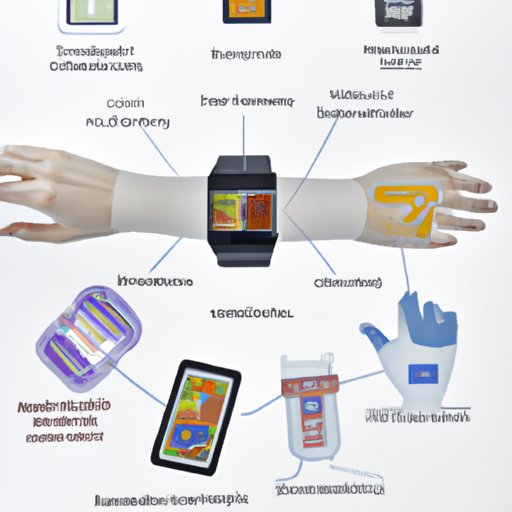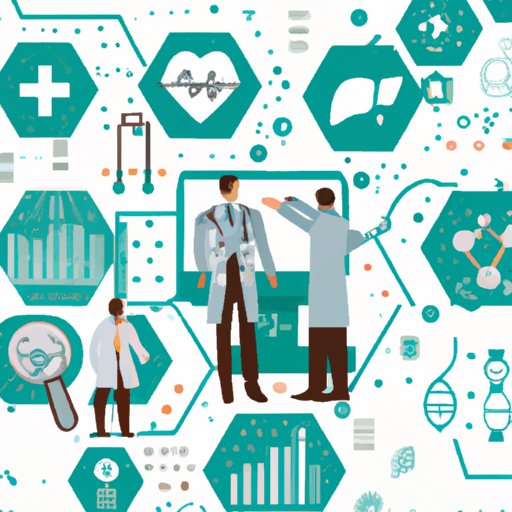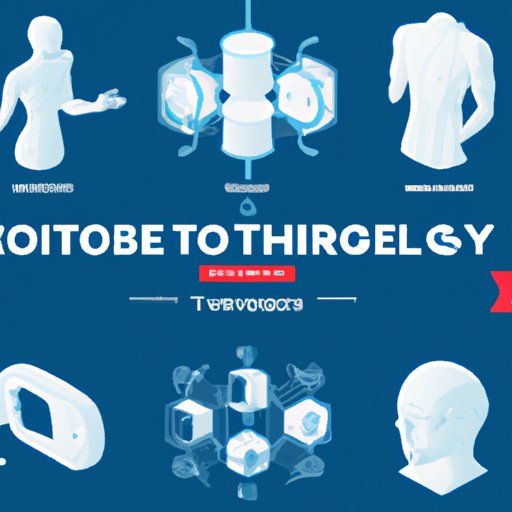Introduction
Technology has had a massive impact on the medical field over the past few decades. From telemedicine to AI and automation to wearable devices to big data analytics to robotics to 3D printing, technology has revolutionized the way medical professionals diagnose and treat patients. In this article, we will explore how technology has changed the medical field and how it is continuing to do so.
Telemedicine and Its Impact on the Medical Field
Telemedicine, or the use of digital information and communication technologies to provide remote clinical services, is one of the most important technologies that has changed the medical field. According to a study conducted by the American Telemedicine Association, “Telemedicine can improve access to care, reduce costs, and enhance the quality of care delivered.”
The benefits of telemedicine are vast, ranging from increased access to healthcare for rural and underserved populations to improved patient outcomes. For example, according to a study published in the journal Health Affairs, “telemedicine was associated with lower hospital admission rates, lower readmission rates, and lower mortality rates.”
Telemedicine is being used in many different ways in the medical field. It is being used to diagnose and treat patients remotely, to consult with other medical professionals, and even to provide mental health services. Many hospitals and healthcare systems now offer telemedicine services as an alternative to traditional in-person visits.

AI and Automation in Healthcare
AI and automation have also had a huge impact on the medical field. AI, or artificial intelligence, is the ability of a machine or computer system to learn and make decisions based on its environment. Automation, on the other hand, is the process of automating tasks and processes using technology. Together, they are transforming the way medical professionals diagnose and treat patients.
The benefits of AI and automation in healthcare are numerous. They can help medical professionals make more accurate diagnoses and treatments, reduce medical errors, and increase efficiency. They can also help reduce costs and improve patient outcomes. For example, according to a study published in the journal BMC Medical Informatics and Decision Making, “automated decision support systems were associated with reduced mortality and improved quality of care.”
AI and automation are being used in many different ways in the medical field. They are being used to detect diseases and conditions, to monitor vital signs, to assist in surgical procedures, and to provide personalized treatment plans. Many hospitals and healthcare systems are now utilizing AI and automation to improve the quality of care they provide.

Wearable Devices in Medical Care
Wearable devices are another technology that has had a major impact on the medical field. Wearable devices are electronic devices that are worn on the body and track various metrics such as heart rate, sleep patterns, and physical activity. They can be used to monitor a patient’s health in real time, providing valuable data that can be used to diagnose and treat conditions.
The benefits of wearable devices in medical care are significant. They can help medical professionals diagnose and treat conditions more quickly and accurately, as well as provide more personalized care. They can also help reduce costs and improve patient outcomes. For example, according to a study published in the journal JMIR mHealth and uHealth, “wearable devices were associated with improved medication adherence, better self-management of chronic conditions, and improved quality of life.”
Wearable devices are being used in many different ways in the medical field. They are being used to monitor vital signs, to detect diseases and conditions, to provide personalized treatment plans, and to collect data for research purposes. Many hospitals and healthcare systems now offer wearable devices to their patients as a way to monitor their health.

Big Data Analytics in Healthcare
Big data analytics is another technology that has had a major impact on the medical field. Big data analytics is the process of collecting, organizing, and analyzing large amounts of data to uncover trends and insights. It can be used to gain valuable insights into patient behaviors and health outcomes, as well as to identify potential risks and opportunities.
The benefits of big data analytics in healthcare are numerous. It can help medical professionals make more informed decisions, improve patient outcomes, and reduce costs. For example, according to a study published in the journal JAMA Network Open, “big data analytics was associated with improved accuracy of diagnosis, improved patient safety, and reduced costs.”
Big data analytics is being used in many different ways in the medical field. It is being used to identify potential risks and opportunities, to develop personalized treatment plans, to predict disease outbreaks, and to track patient outcomes. Many hospitals and healthcare systems are now utilizing big data analytics to improve the quality of care they provide.
Robotics in Surgery
Robotics is another technology that has had a major impact on the medical field. Robotics is the use of robots to perform tasks that would otherwise be performed by humans. It can be used to assist medical professionals in performing surgery, as well as to automate certain tasks and processes.
The benefits of robotics in surgery are numerous. It can help medical professionals perform surgeries more accurately and efficiently, as well as reduce the risk of errors. It can also help reduce costs and improve patient outcomes. For example, according to a study published in the journal Annals of Surgery, “robotic surgery was associated with shorter hospital stays, fewer complications, and lower mortality rates.”
Robotics is being used in many different ways in the medical field. It is being used to perform complex surgeries, to assist in diagnostic imaging, to monitor vital signs, and to automate certain tasks and processes. Many hospitals and healthcare systems are now utilizing robotics to improve the quality of care they provide.
3D Printing in Medicine
3D printing is another technology that has had a major impact on the medical field. 3D printing is the process of creating three-dimensional objects using a 3D printer. It can be used to create prosthetics, implants, and other medical devices, as well as to create detailed models of organs and tissues.
The benefits of 3D printing in medicine are significant. It can help medical professionals create more personalized and effective treatments, as well as reduce costs and improve patient outcomes. For example, according to a study published in the journal Science Translational Medicine, “3D printing was associated with improved accuracy of diagnosis, faster time to treatment, and reduced costs.”
3D printing is being used in many different ways in the medical field. It is being used to create prosthetics, implants, and other medical devices, to create detailed models of organs and tissues, and to create personalized medications. Many hospitals and healthcare systems are now utilizing 3D printing to improve the quality of care they provide.
Conclusion
In conclusion, technology has had a massive impact on the medical field over the past few decades. From telemedicine to AI and automation to wearable devices to big data analytics to robotics to 3D printing, technology has revolutionized the way medical professionals diagnose and treat patients. The benefits of these technologies are vast, ranging from increased access to healthcare to improved patient outcomes. As technology continues to evolve, it is sure to continue to shape the medical field in new and exciting ways.
(Note: Is this article not meeting your expectations? Do you have knowledge or insights to share? Unlock new opportunities and expand your reach by joining our authors team. Click Registration to join us and share your expertise with our readers.)
